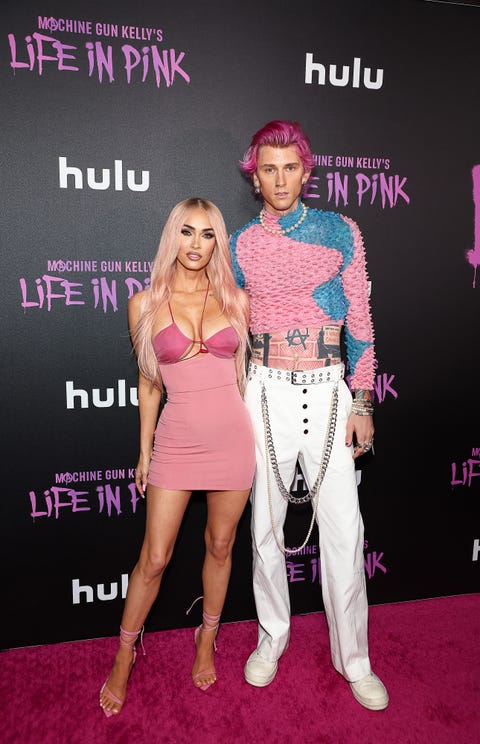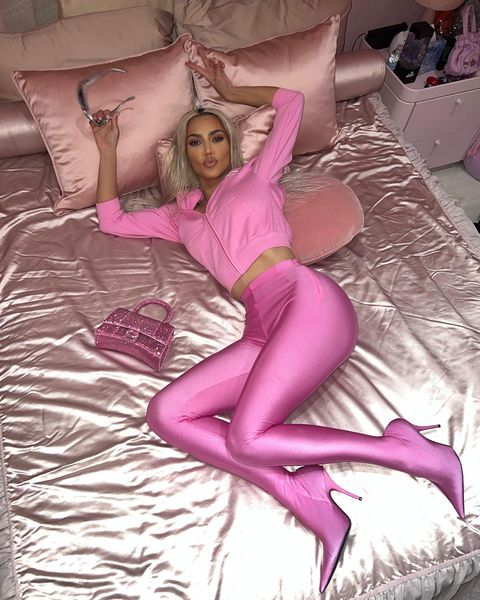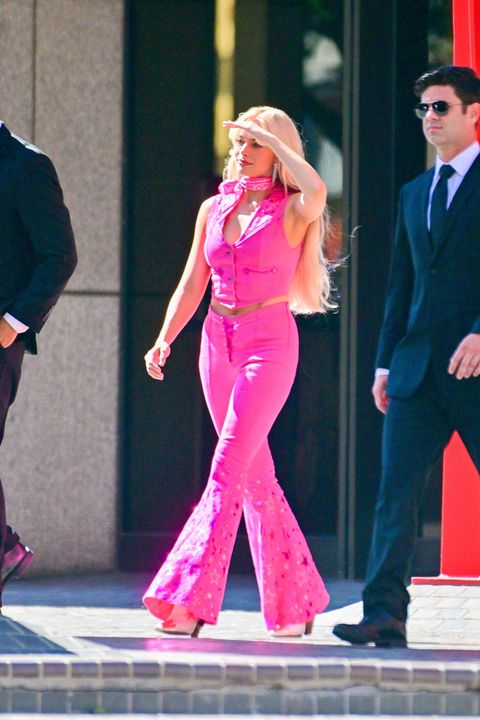
Getty Images/Mega/Instagram
Style Points is a weekly column about how fashion intersects with the wider world.
When this spring’s Met Gala, with its theme of “gilded glamour,” collided with the leaked draft of the Supreme Court’s Roe v. Wade ruling, there was plenty of talk about the cognitive dissonance of the two events—celebrities preening in couture while the rollback of abortion rights loomed. But, of course, the timing was just an unfortunate coincidence, not a manifestation of some kind of post-Roe mindset in fashion.
More jarring might be the way that since then, fashion—in the wake of a new, more circumscribed world for women—has accelerated the rise of a new (old) archetype: the bimbo. On TikTok, self-described followers of the trend congregate on #BimboTok, engaging in “Math is Hard” Barbie cosplay in a repudiation of the girlboss. Onscreen, there’s a sudden prevalence of projects like Peacock’s Angelyne, Hulu’s Pam & Tommy, and, coming up, Greta Gerwig’s much-ballyhooed Barbie, which, if the paparazzi pictures are anything to go on, will include a lot of pink matching sets.
On certain corners of Instagram, Anna Nicole Smith and aughts-era Paris Hilton are held up as avatars. And on red carpets, celebrities are opting for a style that’s been dubbed “Barbiecore” (think: Anne Hathaway’s hot pink look at Valentino couture, Kim Kardashian’s monochrome bubblegum ensemble, or Megan Fox’s abbreviated outfit from the premiere of Machine Gun Kelly’s documentary (titled—what else?—Life in Pink). The hallmarks of the look, beyond lots of pink, are exposed midriffs, sparkly mini bags, and elephantine platforms that evoke Barbie’s credo of “accessories sold separately.” If femininity is a performance, these women are doing it with jazz hands.
When our bodily autonomy is being stripped away, you might expect to see a resurgence of unambiguously empowering fashion: strong-shouldered suits, maybe, or Phoebe Philo-style minimalism. Instead, today’s plethora of body-con, bedazzled, hot pink everything seems calculated to give a second-wave feminist a conniption (with the possible exception of Gloria Steinem, who offered “Bimbo” as an early suggestion for the title of Ms. magazine). In regressive eras, fashion has a tendency to backslide into previous, less liberated times: look at how the ’80s saw the fluffy, ruffly high femininity of Christian Lacroix take over, or the retrograde prairie-chic looks that marked the beginning of the Trump administration. Every reactionary epoch gets the fashion it deserves.
This wave of yassified Stepford style comes along with some backwards-looking societal trends, like celebrities normalizing crash diets. (To be fair, the obsession with “clean eating” and “wellness” that ruled the late 2010s was arguably equally damaging, just gussied up in prettier language.) It seems that many of us are retreating into the armor of a stereotype as a form of protection: You want lockstep hyper-femininity? We’ll do you one better.
But as Marilyn Monroe or Elle Woods could tell you, lurking in the heart of the bimbo is a revolutionary spirit. Sure, you could read the look, and the pose, as a capitulation to social pressure. Or, considering that may of the women sporting this style are accomplished, smart, and savvy, maybe it’s a stealth form of mutiny. The dumbed-down, dressed-up persona is a Pandora’s box, or a MacGuffin, concealing a molten core of rage. As my friend Laurel Pantin recently wrote in her newsletter, “If you’re going to punish me for being a woman anyway, I’m going to be the silliest, brattiest, potty-mouthed no-no of a woman you’ve ever seen. I’ll be the dumbest bitch on earth! Where’s my crown!”
That might be the battle cry of the revamped fashion bimbo: Underestimate me—and my glittery pink platforms—at your peril.
This content is created and maintained by a third party, and imported onto this page to help users provide their email addresses. You may be able to find more information about this and similar content at piano.io
What’s Behind Fashion’s Bimbo Moment?
News Reports PH




0 Comments